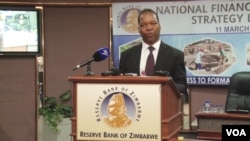In an attempt to rope in galloping inflation and create confidence in the local money market, Zimbabwe’s central bank says the country will use the current multi-currency system for the next five years.
In a statement, the Governor of the Reserve Bank of Zimbabwe, Godwin Mangudya, said lack of confidence in the financial market, high inflation and skewed demand for the United States dollar has forced the government to make additional policy measures to curb public fears over what’s going on in the southern African nation.
Mangudya said, “Government has clearly stated its intention of maintaining a multi-currency system based on dual use of the US dollar and the Zimbabwe dollar. However, the market lacks confidence that the Multi Currency system is here to stay for the foreseeable future. To eliminate speculation and arbitrage based on this issue, the Government has decided to embed the multi-currency system and the continued use of the US dollar into law for a period of 5 years.
“The interbank market exchange rate is now being determined by banks on a willing buyer-willing seller basis. The utilisation in all economic transactions of this formal rate is now made mandatory by law. While economic agents are free to price their goods in US dollars or Zimbabwe dollars, and there are no price controls, the equivalence of US dollar prices and Zimbabwe dollar prices for a commodity should be strictly based on the current interbank exchange rate as determined by the Willing Buyer Willing Seller rate. No discounting of prices for payments made in US dollars shall be allowed and the law provides for strict criminal and civil penalties including US dollar-based fines, suspension or cancellation of business/trading licences for offenders. Amongst other penalties.”
Mangudya said the confidence deficit among economic agents as a result of past hyper inflation experiences has resulted in rational demand for US Dollars as a store of value.
“This is reflected not only in the increasing holdings of foreign currency balances in the banking system. These balances however do not efficiently circulate in the economy due to structural issues in the banking sector.”
He said the lack of confidence and high inflation expectations have “incentivised economic agents to engage parallel market bench-marking of prices and a skewed preference for US dollars for commercial transactions, and forward exchange rate pricing, thus creating a vicious cycle of increasing prices which is self-fulfilling, and is generating higher month to month levels of inflation as well as fuelling adverse inflation expectations.
“The proof of this lies in recent econometric studies done by the University of Zimbabwe, which indicate that inflation is not being caused by the normal real economic variables but by behavioural variables such as confidence, adverse inflation expectations, etc.”
He said the preference for US dollars in the economy has also resulted in a larger than normal demand for foreign exchange to support domestic transactions as opposed to foreign exchange being predominantly used to fund external transactions.




